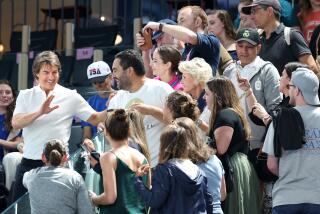Everywhere He Turned
- Share via
Of the 466 American athletes who stayed home from Moscow in 1980 because of the Olympic boycott, Bruce Kennedy might have the most reason to feel aggrieved.
In 1972, the javelin thrower qualified for the Rhodesian Olympic team, which did not compete for political reasons. In 1976, he qualified again, but the Rhodesians boycotted the Montreal Games in protest by some African nations over apartheid. In 1980, having become a U.S. citizen, he qualified for the U.S. team.
Kennedy, however, says he is not angry. “This thing happened 25 years ago. I don’t have scars from it,” said Kennedy, 54, who owns a Pasadena investment firm.
Some members of the 1980 team say the boycott opened the door to a journey of personal discovery, helping them transform disappointment into acceptance, even serenity.
“People get driven by the Olympics for many different reasons and from many different sources,” said diver Megan Neyer, who was 18 at the time. “When you have this dream from the time you are 6 years old
It wasn’t easy, she said. In the mid-1990s, she earned a doctorate in counseling from the University of Florida. Somewhere along the way, Neyer said, she simply let go of the anger.
Debbie Brown was a volleyball standout from El Segundo, co-captain of the U.S. women’s team.
“Not to say it isn’t still a disappointment, but I think I can speak for my volleyball teammates: I think if anybody is still bitter or angry at this point in their life, that would be pretty sad,” Brown said. “To live for 25 years with that anger and bitterness -- it’s one of those things you need to pick up and move on.”
Brown, the women’s volleyball coach at Notre Dame, ran a leg with the Olympic flame in South Bend in 2002.
“I didn’t cry, but I was really overcome with emotion,” Brown said. “It was just the excitement of all that the Olympics represent, of all the hard work that all these athletes from all over the world put in together to compete.”
Sue Walsh was a backstroke swimmer who missed qualifying for the Los Angeles Games, four years after the boycott, by 1/100th of a second.
“My career was done before I expected it and I wasn’t prepared for life after swimming,” she said. “I went through an identity crisis
Now 43, director of endowments and scholarships at her alma mater, North Carolina, Walsh is the mother of two teenage daughters and a 9-year-old son.
“I’ve been through a divorce. I’ve raised three children on my own,” Walsh said. “That was and still is more difficult than that experience.”
Even so, 1980 and 1984 “prepared me,” she said. “Having a dream, a goal, and not seeing it through to fruition -- you realize life is
Kennedy’s low point, he said, came after he failed to qualify for the 1984 Olympics. He attended the L.A. Games as an usher at the Coliseum, site of the track and field competition.
From 1984 to 2003, he said, he did not attend a single track meet. He built a “totally new life,” working in London, then back in California, becoming a father, running marathons.
Two years ago, his daughter, Heather, took up the javelin and asked him to be her coach.
Last July, Kennedy sat in the stands at Hayward Field in Eugene, Ore., site of the 1980 trials -- watching “with tears streaming down my face,” he said -- as Heather finished fifth in the national junior Olympic championships. She starts this fall at Penn, where she’ll be on the track team.
“Her involvement has provided a wonderful opportunity for us to spend hours together -- try driving to meets at Cal, Stanford and Sacramento and see how much talking gets done -- and I wouldn’t trade them for anything.
“In fact, my own athletic experiences pale in terms of sheer enjoyment to those of seeing her athletic skills grow. But more gratifying has [been] to see her competitiveness and determination develop, knowing that these traits will benefit her in the future.”
This year, he added, his son, Colin, started throwing the javelin.
More to Read
Go beyond the scoreboard
Get the latest on L.A.'s teams in the daily Sports Report newsletter.
You may occasionally receive promotional content from the Los Angeles Times.






